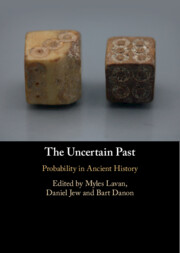Book contents
- The Uncertain Past
- The Uncertain Past
- Copyright page
- Contents
- Figures
- Tables
- Contributors
- Acknowledgements
- 1 Probabilistic Modelling in Ancient History
- Part I Uncertainty
- 2 Assessing the Scale of Property Confiscation in the Ancient Greek World
- 3 Senators and Senatorial Wealth at Pompeii
- 4 The Roman Coinage under the Antonines Revisited
- Part II Variability and Missing Data
- Index
- References
2 - Assessing the Scale of Property Confiscation in the Ancient Greek World
from Part I - Uncertainty
Published online by Cambridge University Press: 18 November 2022
- The Uncertain Past
- The Uncertain Past
- Copyright page
- Contents
- Figures
- Tables
- Contributors
- Acknowledgements
- 1 Probabilistic Modelling in Ancient History
- Part I Uncertainty
- 2 Assessing the Scale of Property Confiscation in the Ancient Greek World
- 3 Senators and Senatorial Wealth at Pompeii
- 4 The Roman Coinage under the Antonines Revisited
- Part II Variability and Missing Data
- Index
- References
Summary
This paper utilizes Monte Carlo simulation to estimate the frequency with which private property was confiscated in the Greek world in the Classical period (circa 480–330 BCE). Confiscation is defined for the purposes of this paper as the uncompensated, sudden loss of landed property. The first step is to establish the demographic context within which confiscation occurred, and then to analyze four mechanisms for the confiscation of property: exile arising from stasis; the expulsion of a population by a foreign power; andrapodismos or mass enslavement; and the imposition of a cleruchy. Other mechanisms by which confiscation occurred, but which cannot be quantified, are briefly discussed. The model shows that, based on the beliefs I hold about the four mechanisms for confiscation that have been analyzed, the average estate owner faced a 2.6–18.6 % chance of experiencing confiscation in his lifetime, with a mean likelihood of 10.5 %. This finding is at odds with the prevailing view that Greek poleis ensured the security of private property, which in turn contributed to the remarkable economic growth of the period. The conclusion suggests some possible responses by the Greeks themselves to the imperfect property security they experienced.
Keywords
Information
- Type
- Chapter
- Information
- The Uncertain PastProbability in Ancient History, pp. 53 - 92Publisher: Cambridge University PressPrint publication year: 2022
References
Accessibility standard: Unknown
Why this information is here
This section outlines the accessibility features of this content - including support for screen readers, full keyboard navigation and high-contrast display options. This may not be relevant for you.Accessibility Information
- 1
- Cited by
